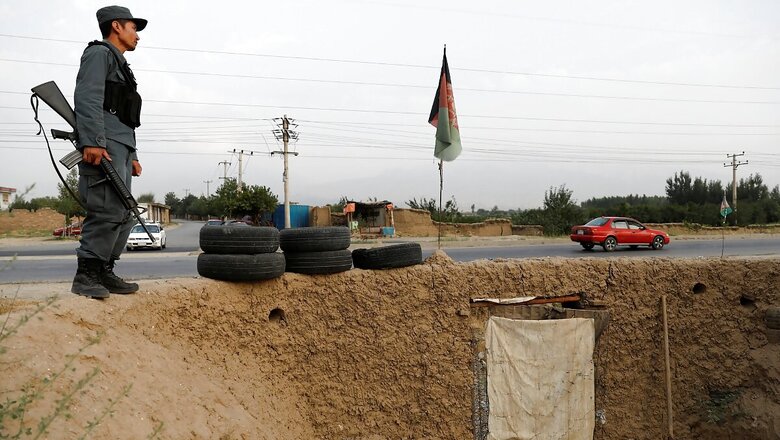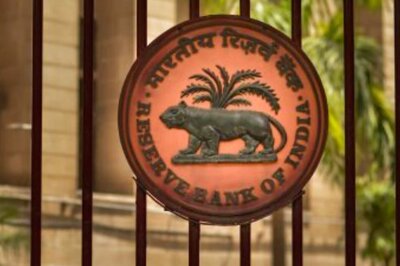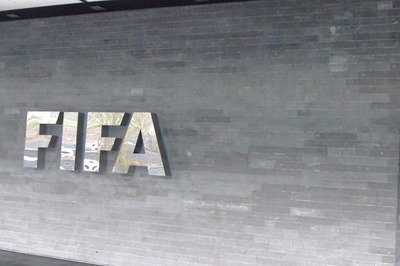
views
Prospects for peace in Afghanistan have darkened. The Taliban is convinced that military victory over Afghanistan as a whole is within its grasp, and there is a widespread belief that the Taliban’s march to power cannot be stopped. The Western press predicts that Kabul will soon, inevitably fall. It is true that Afghanistan is set for more turbulence, yet all is not lost. It is too early to write the epitaph of the current Afghan government.
The recent reversals of the Afghan National Defence and Security Forces’ (ANDSF) positions equally are a setback for the United States and the North Atlantic Treaty Organisation (NATO). Their two decades-long military presence failed to prevent the Taliban, which was provided sanctuary, sustenance and support by Pakistan, from regaining much of the ground it lost in 2001. President Biden promised that US forces would leave Afghanistan in a safe, orderly and responsible way. Their hasty departure, before Afghan forces could make alternate arrangements, has benefitted the Taliban. This action has won former President Trump’s approbation, while former President Bush calls it a mistake.
Biden is continuing the course set by his two predecessors. US ineptitude in handling its exit goes back to President Obama. On December 1, 2009, he announced an additional deployment of US troops and an exit strategy for them, famously criticised as being “all about exit and not at all about strategy”. He set July 2011 as the deadline to begin pulling US forces out of Afghanistan. That is when the Taliban, which temporarily hunkered down, confidently predicted an eventual US defeat. The United States had 11 years to ensure that the ANDSF had the requisite wherewithal to fight on its own.
What Afghanistan Needs
The immediate context of the current crisis is the February 2020 Doha Agreement between the Taliban and the US government. The prime purpose of the Agreement was to secure an arrangement for the complete withdrawal of US forces from Afghanistan, which both protagonists desired. In its anxiety to extricate itself from Afghanistan, the United States had struck a deal directly with the Taliban, blindsiding the Afghan government and undermining it. The absence of any compliance mechanism in the Doha Agreement made the Taliban’s commitments meaningless.
The ink was barely dry after the signing of the Doha Agreement when the Taliban declared that its commitment to reduce violence applied only to foreign forces and not to Afghans. Violence resumed, and killings continued. The Taliban forces have made rapid gains in rural areas, where they have been present for over a decade, on the outskirts of cities. These will not be attacked seriously until end-August, the scheduled pull-out of all foreign forces. Kandahar will have particular symbolic value for the Taliban and will be the focus of its future military contest.
ALSO READ | With Eye on Afghan Taliban, India Must Strengthen Its Security Shield in Jammu and Kashmir
Important international border crossings and customs points have, for now, fallen into the Taliban’s hands. These include Spin Boldak, near Kandahar, on the Pakistan border, Islam Qala (Iran), Torkhundi (Turkmenistan), Hairatan (Uzbekistan), and Sher Khan Bandar (Tajikistan). Marshal Abdur Rahim Dostum’s home base in Sheberghan, an Uzbek stronghold, is under attack. Yet, the loss of Afghan government control on these is not irreversible. Contrary to reports in the media, the Salma Dam on the Hari Rud River in Herat province is very much in the hands of the Afghan government.
Afghanistan at last has a capable, full-time Defence Minister, Bismillah Khan Mohammadi, who is likely to redraw the ANDSF strategy. It will focus on defending 8-9 key provinces and arterial routes, besides major cities. Afghanistan does not need foreign troops. But it does need food, fuel, and firepower. The US government has promised continued assistance of $3.3 billion annually. Several others are contributing, even if more modestly.
Over the weekend, a high-level Afghan delegation led by the Chairman of the High Council for National Reconciliation, Abdullah Abdullah, has been holding discussions with a Taliban delegation in Doha. Pakistan’s Prime Minister Imran Khan wants to host a similar meeting in Islamabad, which is likely to be scheduled after Eid. The Taliban had secured the release of over 5,000-plus prisoners as a pre-condition for commencing negotiations with the Afghan government. To buy time, it now proposes a temporary and not permanent ceasefire if the remaining 7,000 Taliban prisoners are also freed, and all members of the Taliban are delisted by the United Nations (UN) Sanctions Committee.
India Must be Proactive
Some commentators contend that the Taliban has learnt from its past mistakes. It is said to be more moderate and tolerant, as also to have broken ranks with al-Qaida, the Daesh, and other like-minded organisations. They claim that the new Taliban is unlikely to allow the Lashkar-e-Taiba (LeT) and the Hizb-ul-Mujahideen (HuM) to operate from Afghan soil, and that acts like the facilitation of the IC-814 hijackers is a thing of the past.
However, the latest report of the UN’s Analytical Support and Sanctions Monitoring Team notes that the “the Taliban and al-Qaida remain closely aligned and show no indication of breaking ties.” The report notes that like-minded militant groups continue to celebrate developments in Afghanistan as a victory “for global radicalism.” The report broadly hints that Afghanistan under the Taliban’s control will harbour like-minded groups. This will threaten India, as did the camps set up in Afghanistan by the LeT and HuM when the Islamic Emirate was in power in the late 1990s.
For the Taliban, the next stage is to remove what it describes as “the puppet regime of collaborators” and restitute Taliban rule. According to the Taliban spokesperson, Islamic jurisprudence prescribes that Afghans are “obligated to wage Jihad” until the establishment of an Islamic government. The leader of the Haqqani Network, Siraj Haqqani, is the deputy leader of the Taliban. Both US and Afghan intelligence conveyed to India that Siraj Haqqani was behind the July 2008 bombing of the Indian Embassy in Kabul. That Haqqani fighters collaborate with the Daesh is widely known.
India is already engaging to help all those in Afghanistan who are willing to defend the current Islamic Republic. To be taken seriously in the future, India must be proactive. It is time to walk the tight-rope by talking to the Taliban with eyes open and simultaneously helping all those who stand for Afghan sovereignty and republicanism.
The views expressed in this article are those of the author and do not represent the stand of this publication.
Read all the Latest News, Breaking News and Coronavirus News here.



















Comments
0 comment